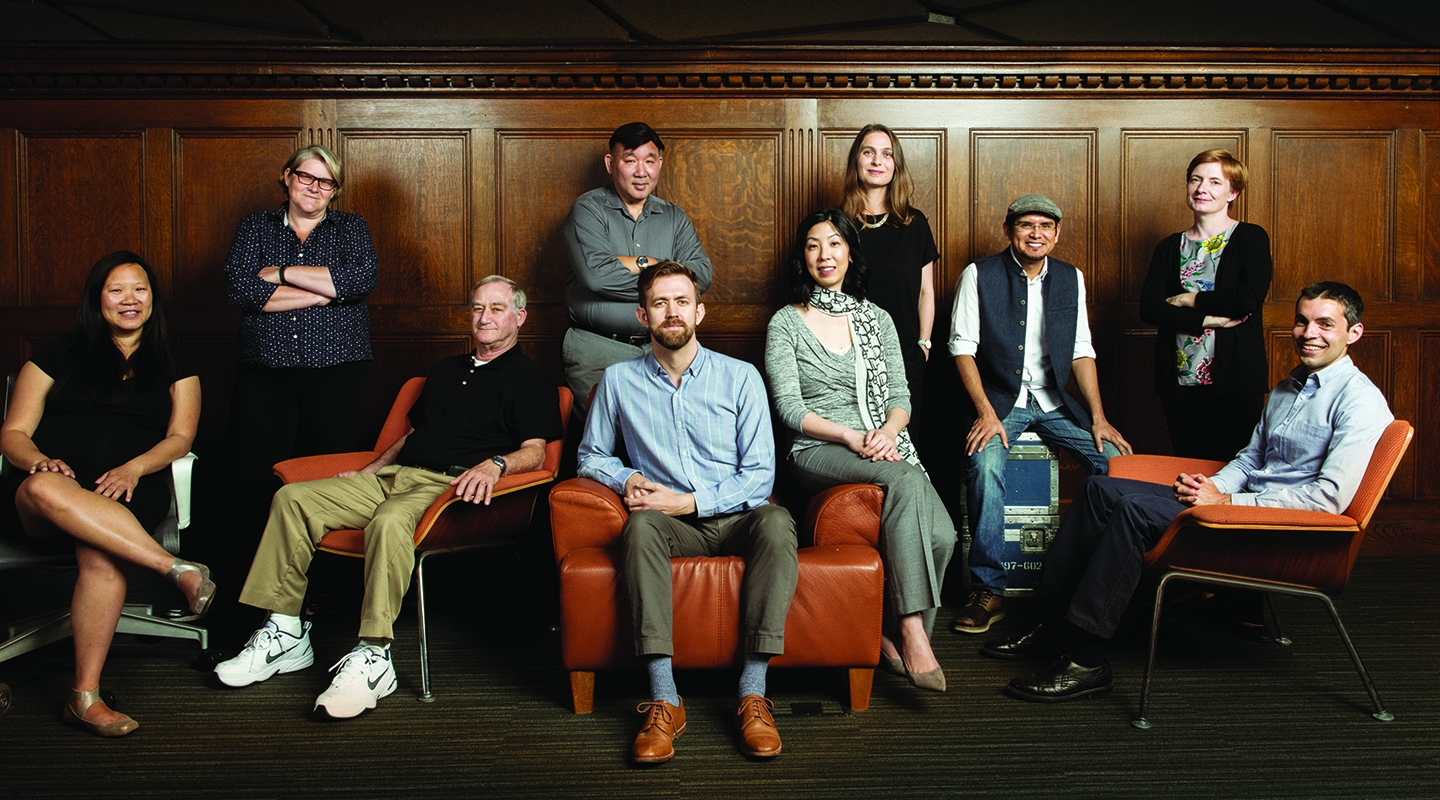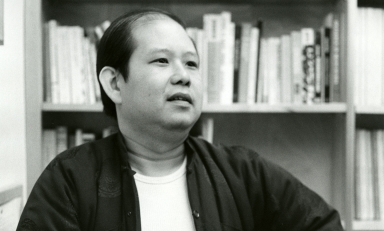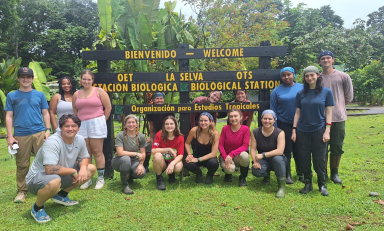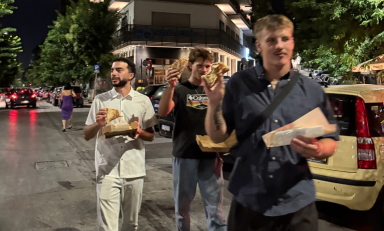These are boom times for economics—Oxy’s biggest major for the last 19 years. As two popular professors prepare to retire, how will the department evolve?
While visiting Oxy as a high school senior, Peter Adamson ’84 sat in on a lecture by second-year faculty member Robby Moore. It was Adamson’s first time in a college classroom, and Moore “made a big impression on me,” he says. “I wanted to go to a liberal arts college and be able to work closely with professors rather than a UC school with massive class sizes, so that was an important reason why I went to Occidental.”
“I had a great experience with the econ department,” adds Adamson, the former chief investment manager for Oprah Winfrey’s management company and current chief investment officer for the SFE Group, whose mission is to lead positive systemic change that strengthens Los Angeles communities. His primary influences were Moore and A.H. “Woody” Studenmund, who joined the College in 1970 and recently became Oxy’s longest-serving faculty member. “Woody was very instrumental in my early career, but the whole group was strong.”
“Woody and I had the same goals,” says Moore, who met his colleague of the last 40 years when Studenmund was on leave in Cambridge, Mass., in 1978 and Moore, a Pomona graduate, was an assistant professor of economics at Harvard, having completed his Ph.D. there a couple of years earlier. “We wanted the best teaching department we could get. We wanted people who were still doing high-quality research, but we wanted the best teaching economists we could find.”
“Economics helps students prepare for business careers, but economics at a liberal arts college helps students prepare for careers in law, management, premed, nonprofits, and more,” adds Studenmund. “That’s the big difference between a business major and an economics major at a liberal arts college.”
Over the last four decades, the economics department has produced CEOs (Art Peck ’77 at Gap Inc.; Dan Springer ’85 at DocuSign; Chris Brickman ’86 at Sally Beauty Supply), business leaders (Daniel Ivascyn ’91, group chief investment officer for PIMCO; Chris Varelas ’85, founding partner at Riverwood Capital; Mal Durkee ’85, a financial institutions adviser and former managing director at Morgan Stanley and Merrill Lynch), and government and education professionals (Stanford professor Kathryn Shaw ’76, one of the first female members of the President’s Council of Economic Advisers; Laura Kawano ’02, a research affiliate at the University of Michigan’s Stephen M. Ross School of Business). And that’s just scratching the surface.
“Some of our most accomplished graduates have come out of the economics department,” says President Jonathan Veitch, “and to a person they attribute their education in economics—and especially their mentorship by Woody and Robby—as the foundation for their success.”
“Economics can be a springboard for many different types of careers after Oxy,” says professor and department chair Lesley Chiou, who has taught at the College since 2005. For the last 19 years, economics has been Oxy’s most popular major. Out of 590 degrees awarded to the Class of 2018, 85 were in economics—an all-time high.
The ongoing appeal of economics at Oxy begins with the faculty. “Every professor I had in the department I really liked,” says Kate Johnstone ’15, who will enroll at UCLA Law School this fall after working as an environmental research manager. “Woody always came to class with this energy that was great and really challenged all of his students. He obviously loved what he did, and I think that helped people love what they were studying.”
While the names “Woody” and “Robby” crop up regularly in almost any conversation about economics at Oxy, Studenmund is the first to spread the credit around. “It really is everybody,” he says. “It’s the faculty who helped in the late ’70s and ’80s. It’s the dynamite new faculty we have now who are leading the department forward. Robby and I are retiring soon, and it’ll just be the younger faculty who have been here 10 or 15 years leading the department, and the students love them as well.”
When Studenmund arrived at Oxy in the fall of 1970, “I didn’t have any place to live, and my car and furniture hadn’t arrived,” he recalls. “I had a fever of 102 and a broken leg, and the bus from the airport dropped me off at Arroyo Seco in Pasadena and they said that was the closest they could get to Occidental.”
As good fortune would have it, he met recent Oxy grad Dave McMenamin ’69 at the bus stop, who offered him a ride to campus. His parents—professor of biology John McMenamin ’40 and alumni relations director Addie (Grant) McMenamin ’40—“put me up for two weeks and invited me for Thanksgiving,” he adds. “They welcomed me to Oxy in a way that made me feel like a part of a family. Ever since then I’ve tried to make others feel the same way.”
This was the humble landing—the butterfly-flapping-its-wings moment—of the professor who would spark the modern economics major at Oxy, rebuilding the department into the force that it is today.
The study of economics dates back to the founding of Occidental, when “political economy” was part of the College’s original course of study. In 1914, a group of underclassmen formed the Burke Economic Society, named after professor W. Maxwell Burke, “to specialize in the study of economic questions more thoroughly than is possible in the classroom.”
In the decades to follow, the department was guided by such notable figures as 1917 graduate John Parke Young, who taught at Oxy from 1924 to 1942 and retired as chief of the International Finance Section of the U.S. Department of State in 1965, and the legendary Laurence De Rycke, an authority on international economics and business organization who worked for the Department of State prior to coming to Oxy in 1943. De Rycke was “simply a god as far as his students were concerned,” says Studenmund, who has held the De Rycke Professorship since 2007.
In the decade prior to Studenmund’s arrival, economics and business administration majors combined for less than 7 percent of all graduating seniors. The passing of the departmental baton from De Rycke to the next generation (including instructors Joseph Licari and Philip Perry) was accompanied by the College’s elimination of the business administration major in 1971, and an institutional shift that defined economics as “the study of people and how they solve their basic problems of material welfare.”
Instead of a narrow, dedicated focus on information and facts, Studenmund’s approach to economics emphasizes a range of capabilities, including “critical thinking skills, the ability to write well, the ability to work well on a team, and the ability to work well with people from diverse backgrounds,” he says. “If we develop someone with those skills, then they’ve got the ability to apply those skills to a wide variety of fields.”
But a few years later, the economics department was hit with, well, economics. Due to the high inflation happening in the mid-to late-’70s, salaries for economists outside of academia were rising dramatically; within the walls of higher education, not so much. Between 1974 and 1978, all four of Studenmund’s colleagues left for greener pastures.
In a 1977 memorandum to President Richard C. Gilman and the Faculty Planning Committee, Studenmund wrote: “What worries me is that a lack of financial commitment to the economics department will inevitably result in a decrease in the quality of teaching in our department and therefore a decrease in the attractiveness of that department to students.”
“I had a chance to try to build the department the way I thought it made sense,” Studenmund recalls. “What I realized was that recruiting is the key. If you go out of your way to hire the best people you can, you have a chance to put together a superstar department. So that’s what I set out to do.”
San Fernando Valley native Robby Moore became a cornerstone of the Oxy econ rebuild, a group that included Jim Halstead (who taught at Oxy from 1977 until his retirement in 2004) and Jim Whitney (who retired in 2014 after 32 years at Oxy). “We added some really excellent people who stayed a very long time,” says Moore, who left Harvard for Oxy in part because “it was a high-quality liberal arts college in a place that’s somewhat warm,” he says with a laugh.
In 1981, economics became Oxy’s most popular major—a milestone it would repeat for five out of the next six years. By the mid-1980s, when female students began to outnumber men, efforts to diversify the department faculty began in earnest. “The economics profession is dominated by white males,” Studenmund says. “We were trying to diversify the department, because we believed that a diverse faculty would serve our students better.”
Today, out of 10 tenure-track economists, “We’re 50 percent female, and we’re 50 percent nonwhite,” says professor Kirsten Wandschneider, who arrived at Occidental in 2007 and just completed a three-year term as department chair. “It’s the culture of the department that makes people want to spend their careers here. Robby and Woody have strengthened and fostered that environment, and it’s been really transformative.”
That diversity extends to the curriculum as well. “Many of us work in areas that were unknown or did not exist 30 years ago,” says Chiou, who specializes in industrial organization and applied econometrics, including Internet economics. “One of the goals of the department is to partner with other departments on campus to bring interdisciplinary programs and opportunities to our students,” she adds—a notion that Studenmund fully endorses: “We wouldn’t be as strong as we are if it weren’t for the rest of the College helping our students become well rounded and intellectually diverse.”
Wandschneider’s research areas include European monetary and financial history, international macroeconomics, and the development of financial institutions and markets. She encourages Oxy students to think about economics as a social science: “How does the individual interact with society? How do we make choices? How do we allocate resources? These are very basic economic questions and we want students to see that there are really broad applications.”
The expanding terrain of economics is a hot topic for associate professor Bevin Ashenmiller, an environmental economist whose research spotlights recycling, evaluation of environmental programs, and energy and climate policy. “One of the things that I really focus on with my students is that the tools of economics can be very valuable across lots of different fields and lots of different topics of interest,” says Ashenmiller, who wants to show students that economics isn’t necessarily what they took in AP econ during high school.
Ashenmiller—who served as a senior economist with the White House Council of Economic Advisers in 2012-13—teaches Econ 101 as part of Oxy’s California Environment Semester, a program for first-years in partnership with geology professor Margi Rusmore and biology professor Gretchen North. “We spend four days in Yosemite and three days on the California coast and three days in Death Valley, and students get to do all these really cool things,” she says. Her goal is to strengthen “their knowledge and understanding of what it is that economists can do and what an economist looks like.
“Economists are not any particular demographic,” she continues. “They’re really amazing people who come from all kinds of different backgrounds. Because we are part of a liberal arts college, we are able to create these interdisciplinary opportunities for students that can become life-changing experiences.”
As an undergraduate at Oxy, “I remember traveling to Guatemala on an Anderson grant and doing research on microfinance programs and business education programs for women,” says Ken Smutny ’08, head of U.S. marketplace display ads sales and programmatic sales for the United States, Europe, and Japan at Amazon. “On a Schwartz grant I was sent to Montana to learn about property rights, and those lessons still stay with me today.”
Of all of his professors at Oxy, former economics professor Giorgio Secondi was the biggest influence on Smutny. “He, more than anybody, helped me learn to write, and that was in my freshman Core class. The lessons that he gave me, I still share with my team today.”
A recipient of both the Donald R. Loftsgordon Memorial Award for Outstanding Teaching and the Linda and Tod White Teaching Prize, Secondi left Occidental for Phillips Exeter Academy in 2008 in large part because he was “a bit frustrated by the size of the classes [up to 35 students] that I taught … small for a college, but still big,” he said in a 2013 interview.
“I think over time we asked too much of our econ faculty,” Moore says. “Different people leave for different reasons, but we had to work awfully hard with much higher enrollments.”
“We don’t want to become so attractive to the students that we can’t meet their needs educationally,” Studenmund says. “We have had to make some compromises in terms of our program because we couldn’t do it for all our students.” To that end, the department dropped a senior thesis from its requirements for graduation, although “in some perfect world we would like to require it again,” he adds.
Another area the faculty hopes to address is the ratio of male to female students—roughly 2-to-1, which mirrors the national average. Students of color and first-generation students are similarly underrepresented, and Wandschneider and associate professor Mary Lopez have been involved with a group of undergraduate liberal arts colleagues across the nation that is thinking about diversity and economics and how to change the student experience.
“We would like to get the message across that econ is for everybody,” Wandschneider says. “When I was a student of economics, I had to just push through. And I would like a more diverse group of students to know that they can find a home in economics the way I have found a home as a faculty member in this department.
“Economics as a profession has changed,” she adds. “So I think we need continuous curricular innovation, building on the foundations of active learning that especially Robby has spearheaded in the department. We need more opportunities for high-impact research practices where we get one-on-one time with students, or one faculty member with a small group of students. This is where the field is moving—including more quantitative and more computing skills—and the more we can do with students in this area, the better we prepare them to move on.”
Early in his career at Oxy, Studenmund was mistaken for a student at the installation banquet of the Eagle Rock Chamber of Commerce, until he was introduced as the speaker. He also appeared as an extra in the 1973 Disney movie The World’s Greatest Athlete, running alongside several Oxy students as a trackman in some scenes shot at Cal State L.A.
A youthful-looking 73, Studenmund plans to teach through the 2020-21 academic year at Oxy, which will bring his tenure to a record 51 years. After that, “Who knows?” he says. “What I don’t want to do is to be sitting in a tenured slot preventing some young professor from having the opportunity that I had.”
Reflecting upon his own upcoming retirement in May 2019, “I think it’s time,” Moore says. “I feel like I’ve done a lot of what I wanted to do at Oxy. Retirement gives you a chance to mull over and invent a new life, which is a challenge and something I’m looking forward to. But I feel like we’re leaving the department in great shape and they’re going to do great things.”
“Robby and Woody have literally given us a lifetime of service and dedication,” says Chiou, who notes that she was born in 1978—the year Moore began teaching at Oxy. “We will build upon their contributions and our trajectory to lead the department forward.”
“We all have different strengths and interests and specializations, but we all work for the same goal—to create opportunities for the students, to teach and engage them, and to turn them into critically thinking economic citizens,” Wandschneider adds. “I think that’s the beauty of it.”
Peter Gilstrap wrote “Twenty Something” in the Spring issue. Photos by Max S. Gerber & Marc Campos.




